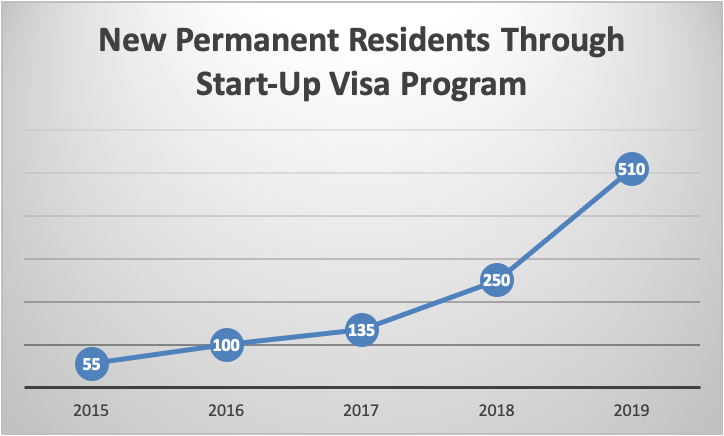
U.S. President Donald Trump’s overhaul of the H-1B visa program in October made it more expensive and difficult to get highly-skilled immigrant workers into the United States – and likely gave Canada’s Start-Up Visa Program a much-needed boost.
Under the sweeping changes to the H-1B visa program in the United States, the wage scale employers use to figure out how much to pay highly-skilled foreign workers was bumped up by the U.S. Department of Labor.
The move came as the U.S. Department of Homeland Security also upped the degree requirements for those applying under the H-1B visa program which counts an estimated 600,000 visa holders in the United States.
Watch
The latest round of changes to the H-1B visa program is being seen as a massive blow to American companies.
With those suddenly higher costs for immigrants with tech skills south of the border, foreign investors looking to set up in North America are expected to take a closer look at Canada and its Start-up Visa Program.
That program grants Canadian permanent residence to qualified immigrant entrepreneurs. It aims to recruit innovative entrepreneurs to Canada and introduce them to Canadian investors so these budding entrepreneurs can start their businesses in Canada.
Under the Start-Up Visa program, three types of private-sector investors are considered: angel investors, venture capital funds, and business incubators.
Read More
How To Move To Canada From The United States: A Comprehensive Guide
How to Apply for Canada Immigration from South Korea
How To Apply for Canadian Immigration from Syria
A designated angel investor group must invest at least $75,000 into the qualifying business. Candidates can also qualify with two or more investments from angel investor groups totaling $75,000.
A designated venture capital fund must confirm that it is investing at least $200,000 into the qualifying business. Candidates can also qualify with two or more commitments from designated venture capital funds totaling $200,000.
A designated business incubator must accept the applicant into its business incubator program.
It is up to the immigrant investor to develop a viable business plan that will meet the due diligence requirements of these government-approved designated entities.
Watch
That’s usually done with the help of business consultants in Canada’s start-up ecosystem and experienced corporate business immigration lawyers who can ensure a start-up’s business plan meets all industry-required terms and conditions.
Candidates to the Start-Up Visa program can initially come to Canada on a work permit supported by their designated Canadian investor before qualifying for permanent residence once their business is up and running.
The basic candidate eligibility requirements for the Start-Up Visa program are:
- a qualifying business;
- a commitment certificate and letter of support from a designated entity;
- sufficient unencumbered, available and transferable settlement funds, and;
- proficiency in English or French at the minimum Canadian Language Benchmark level 5
Ottawa does not give financial support to new Start-up Visa immigrants.
When candidates apply, they need to give proof they have the money to support themselves and their dependants in Canada. This money cannot be borrowed.
The amount needed depends on the size of the candidate’s family.
Settlement Funds Needed Under Start-Up Visa Program
| Number of family members | Funds required |
| 1 | $12,960 |
| 2 | $16,135 |
| 3 | $19,836 |
| 4 | $24,083 |
| 5 | $27,315 |
| 6 | $30,806 |
| 7 | $34,299 |
| Each additional family member | $3,492 |
Certainly, the Start-up Visa program is growing in popularity.
In 2019, the total number of new permanent resident approved admissions reached 510, more than double the 250 welcomed in 2018. The figures have been increasing steadily over the last five years.
The Start-Up Visa also represents an important option for international students, many of whom do not qualify for permanent residence through the skilled worker immigration streams.
While Ottawa has taken steps to gear up the Express Entry system to favour international students, they are by no means guaranteed to qualify for a coveted Invitation to Apply under the Comprehensive Ranking System (CRS).
The minimum score needed to qualify has often been over 470, leaving many students unable to qualify even with the support of a job offer from a Canadian employer.
These candidates can either sit in the Express Entry pool and hope the minimum score under the CRS falls or they can make the transition from temporary to permanent residence.
This is where the Start-Up Visa program becomes an option.
Unlike almost every other federal and provincial-level entrepreneur program which requires a minimum of one or two years of previous experience either owning a business or in top-level management, the Start-Up Visa program does not require previous management experience.
The support of a government-designated entity is enough. And that support can be either financial or in the form of accepting the candidate into a business incubator program.
Immigrants who avail themselves of the Start-Up Visa program consistently report that it is quick, both for the initial work permit and permit residence application.
With a viable start-up business project, an immigrant entrepreneur can expect it to take about four to six months to secure a commitment certificate or letter of support from a designated entity. Once that letter of support is received, the application for permanent residence can be submitted. It will then take approximately 18-months to finalize the application through to the issuance of a permanent residence visa.
For the candidate to qualify for permanent residence:
- The intended business must be incorporated and carrying on business in Canada;
- The candidate must own at least 10 per cent of the voting rights in the corporation, and;
- No other person can hold 50 per cent or more of the voting rights in the corporation.
As many as five candidates can have their permanent residence application supported by the same business investment.
But that can come with a risk. Certain candidates may be designated as essential to the business. If any of the essential candidates withdraw their applications or are refused, all other candidates under the same business investment will see their applications terminated.
Surveys suggest Start-Up Visa candidates usually go on to succeed in Canada, in terms of growing their business, attracting further investment, networking or selling their business for a profit.
Through its Toronto based facilities, Immigration.ca works extensively with industry-acclaimed designated entities in the Canadian start-up ecosystem. The firm provides a range of hands-on business advisory services to help intending entrepreneur immigrants and their start-up business concept meet all industry requirements.
To find out if you qualify for the Start-Up Visa program, click here.


